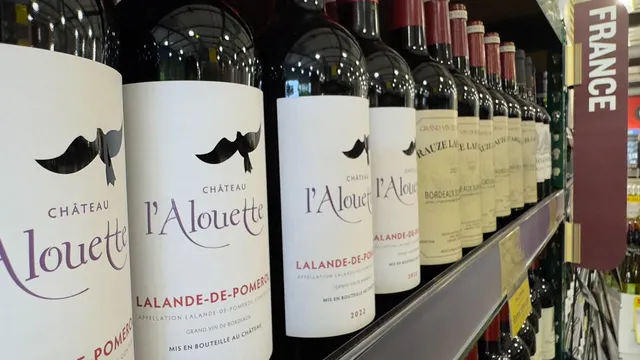
Americans face steep price hikes on wines due to Trump’s tariffs
2025-04-10 17:16- President Trump's tariffs are raising costs for imported wines and Scotch whisky for American consumers.
- Industry experts predict that retail prices for some wines could increase by nearly 30% due to these tariffs.
- The tariffs, coupled with immigration policies, are negatively impacting the alcoholic beverage market and consumer spending.
Express your sentiment!
Insights
Producers and importers of alcoholic beverages in the United States have raised concerns over President Donald Trump's recent tariffs, termed 'Liberation Day' tariffs, which could significantly impact the costs of imported alcohol. Announced on April 2, 2025, these tariffs affect virtually every nation the U.S. trades with, leading to notable price increases for wine and spirits, particularly from Europe. Industry experts believe the immediate effects will be felt by American consumers who enjoy European wines and Scotch whisky as these products will be sold at higher prices due to compounded costs at various stages of distribution. Bartholomew Broadbent, the owner of a Virginia-based wine wholesaler, emphasized that while French wines are subject to a 20% tariff, the actual increase in retail prices could reach almost 30%, inflating the cost of a $9.99 bottle to approximately $13 or $14. With over 80% of Broadbent's business now affected by the new tariffs, the industry's outlook remains bleak. The likewise negative perspectives are shared by French exporters and distributor partners in the Burgundy region, which exported nearly 21 million bottles to the U.S. recently. They have echoed that the tariffs will adversely impact everyone involved in the alcoholic beverage market. Scotch whisky producers face uncertainty as the introduction of a 10% tariff on goods from the U.K. is estimated to cause American retail prices to rise correspondingly. Smaller distilleries might struggle more than larger brands, as they typically have fewer markets to offset the increased costs. Drew McKenzie Smith from Lindores Abbey Distillery pointed out that these raised costs loom significant for smaller producers, possibly putting their businesses at risk. In addition to tariffs, immigration policies under President Trump also weigh heavily on sales for companies like Constellation Brands, which sees a substantial percentage of its beer sales come from Hispanic consumers. CEO Bill Newlands highlighted that apprehension surrounding immigration issues is causing Hispanic consumers to reduce spending, further stressing the company's overall revenue. Despite the challenges posed by tariffs, Constellation is adjusting its marketing strategies, yet it still struggles amid limited consumer spending among key demographics. Overall, both the alcoholic beverage and consumer sectors are bracing for the negative financial impacts of these policies, signaling a challenging market ahead for many businesses.
Contexts
The history of U.S. tariffs on imported beverages reflects the evolving economic priorities and regulatory frameworks of the nation. Tariffs have been a vital instrument for shaping the beverage market, impacting everything from consumer prices to the competitive landscape for domestic producers. The imposition of import tariffs dates back to the early years of the United States, with the intent to protect fledgling industries. These tariffs were often variable, depending on the beverage category, with notable examples including spirits like whiskey and beer, which faced heightened tax burdens due to their social implications and revenue potential for the government. As the country progressed through the 19th and 20th centuries, tariffs on imported beverages were frequently adjusted in response to international trade dynamics, public health considerations, and domestic economic conditions. The Volstead Act of 1919, which enforced Prohibition, significantly altered the landscape by eliminating the legal avenues for the importation of alcoholic beverages, thereby affecting tariff applications in that sector. It wasn't until the repeal of Prohibition in 1933 that the U.S. government began to reestablish a tariff framework that focused on protecting local breweries and distilleries from foreign competition. This period underscored a shift in focus from outright bans to regulatory frameworks that sought to create a balance between domestic interests and international trade obligations. In recent decades, the United States has seen tariffs on imported beverages shaped by broader economic agreements and global trade policies. The North American Free Trade Agreement (NAFTA) and subsequent trade agreements aimed to reduce trade barriers and eliminate tariffs on beverages between member nations. However, specific cases still emerged where U.S. tariffs on imported beverages escalated, particularly concerning products viewed as harmful or unfairly subsidized in their home markets. The trade tensions of the past few years have further complicated this landscape, with rising tariffs on specific beverage categories as a response to perceived inequalities in trade practices, particularly with countries like China and the European Union. Overall, the history of U.S. tariffs on imported beverages paints a complex picture of a nation balancing protectionist desires with a commitment to fair trade. As the global market continues to evolve, so too will the strategies surrounding tariffs. Future considerations may include public health outcomes associated with certain beverages, climate change impacts on production, and consumer demand for imported product variety. All of these factors will likely play a significant role in shaping tariff policies in the beverage sector moving forward, underscoring the importance of ongoing research and analysis in this critical area.